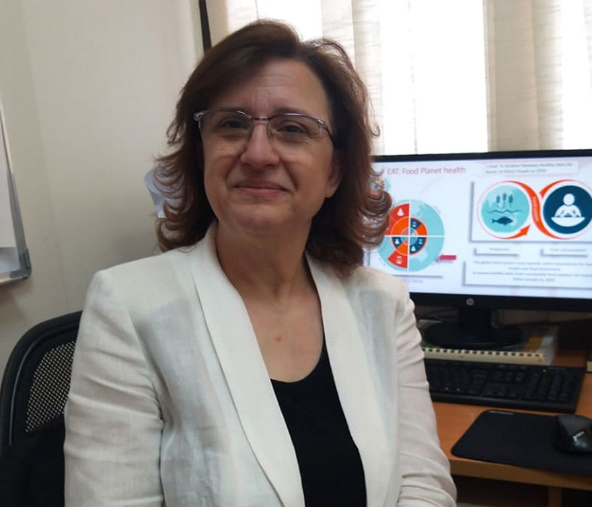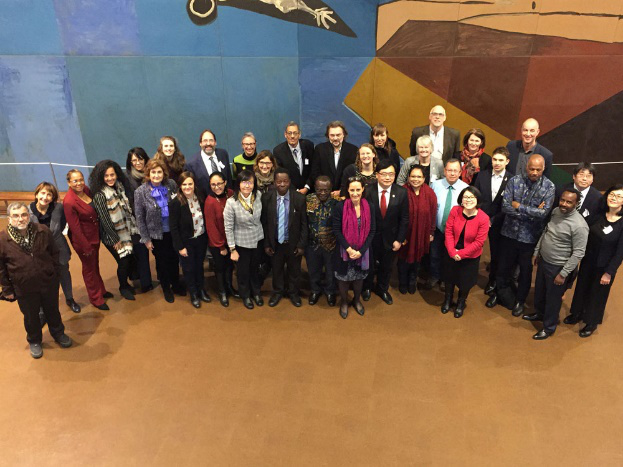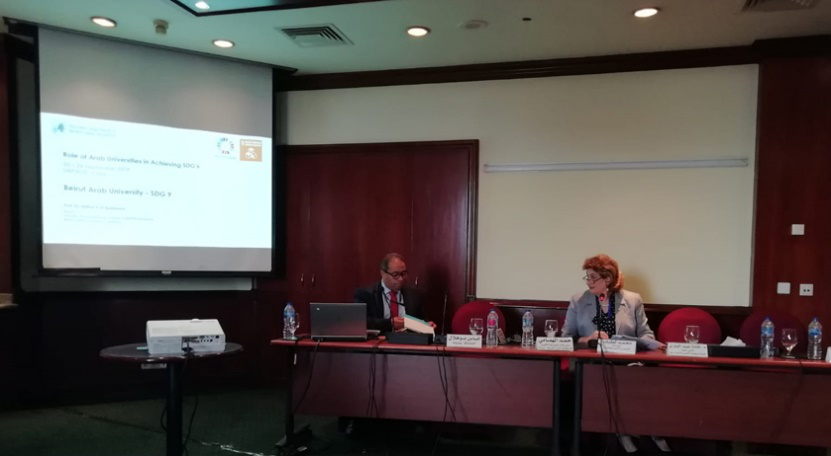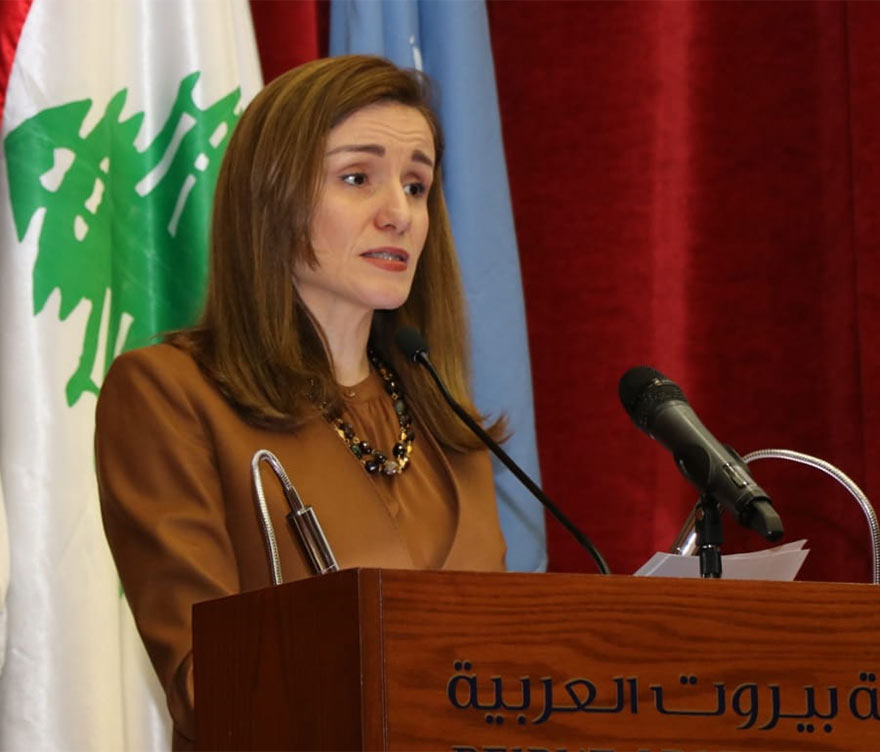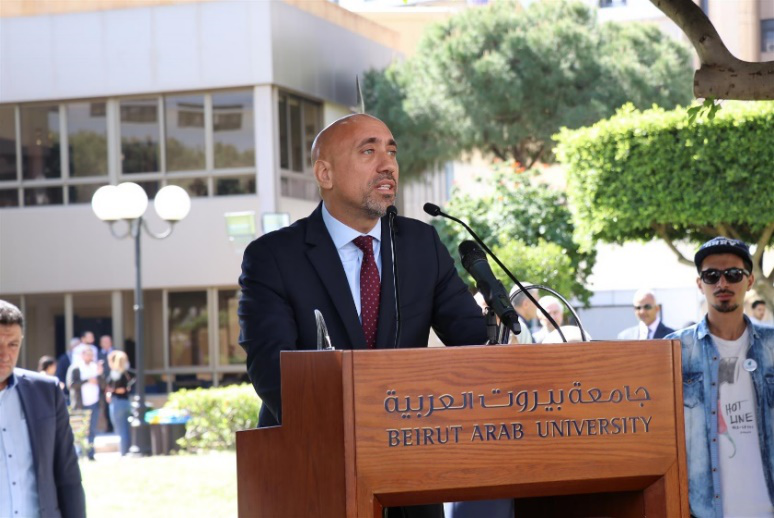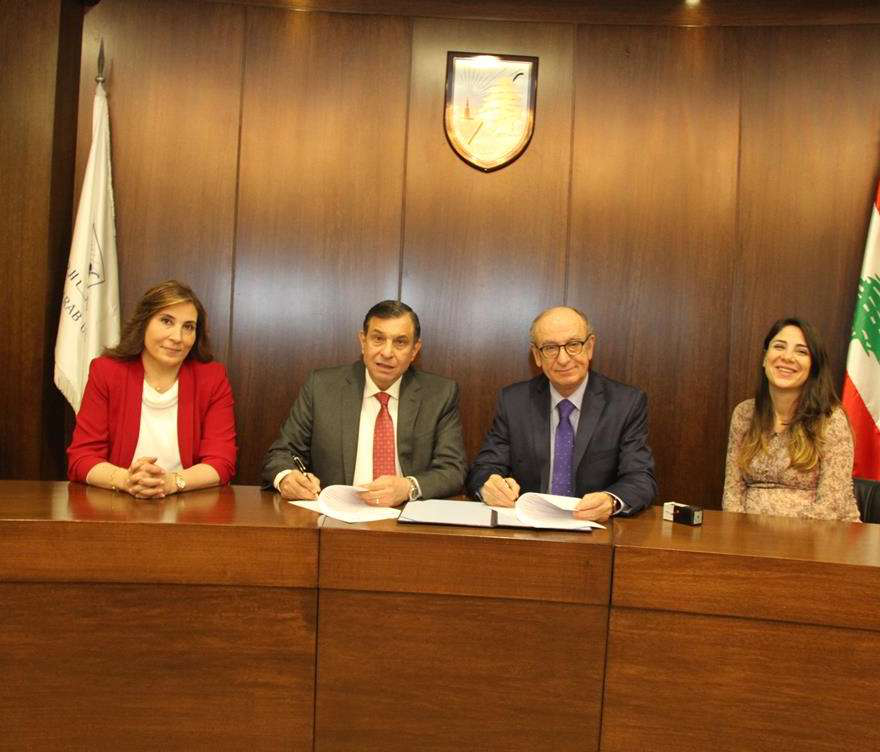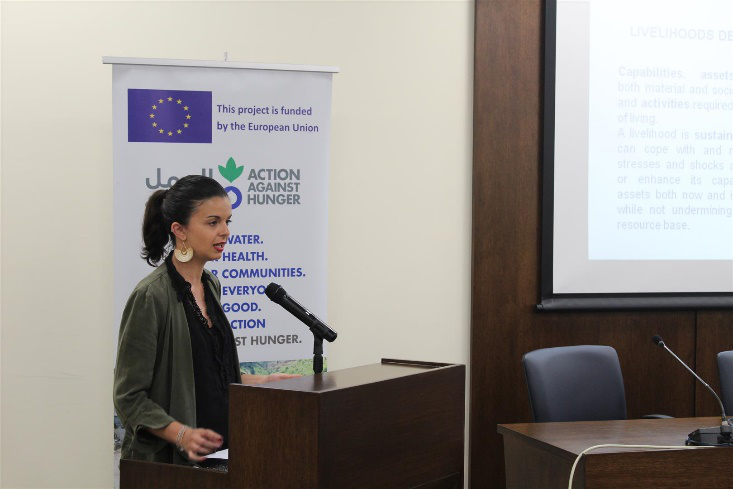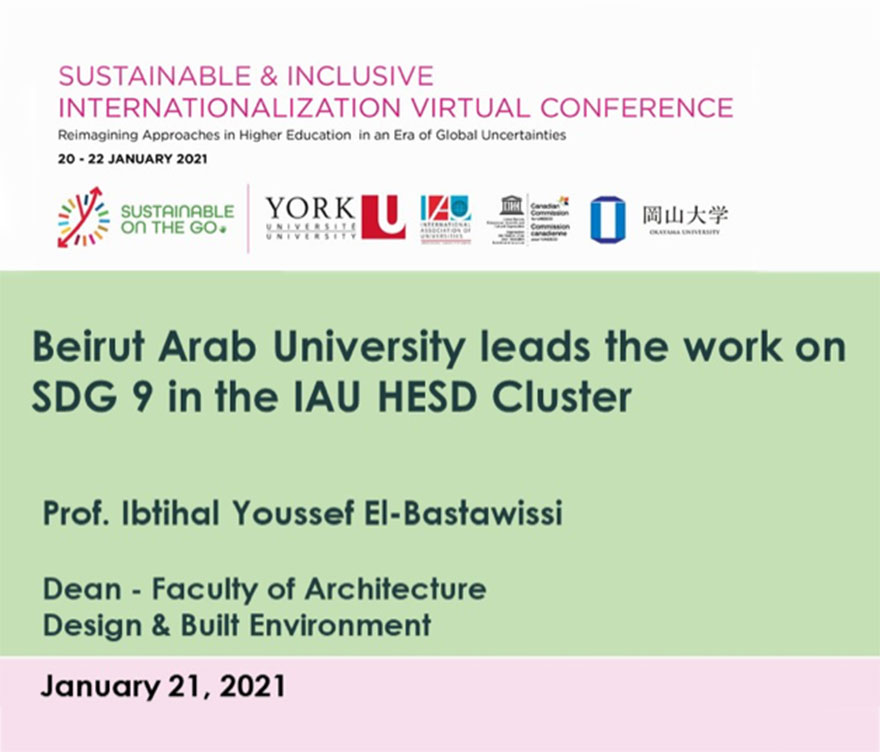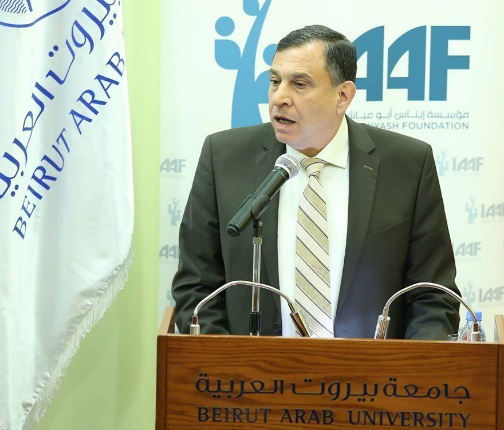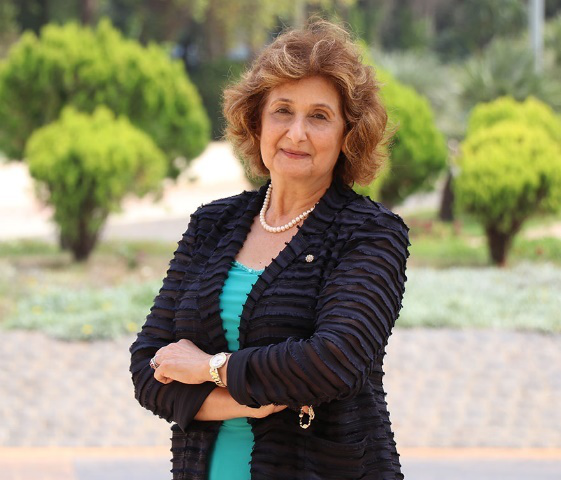Initiation/Participation in Cross-Sectoral Dialogues About SDGs Involving Government & NGOs
The Faculty of Health Sciences at Beirut Arab University presented by Dr. Leila Itani, Assistant Professor at the Nutrition & Dietetics Department delivered a lecture on the 8th of April 2022 entitled "Sustainable Healthy Dietary Patterns". This participation was part of 8 modules offered through the educational activities of the series of SDGs Courses organized by the university of Pavia /Italy for Spring 2021-2022.
The course aimed to provide knowledge on nutrition, lifestyle, and wellbeing, emphasizing a sustainable diet. In this respect, Dr. Itani presented in her talk the role of the food system and unhealthy dietary patterns in disrupting the resilience of the earth’s biophysical limits and transgressing their safe operating space contributing to climate change and loss of ecological resources.
Through the lecture, the definition and composition of the recently proposed healthy sustainable diet and evidence on its role in maintaining food system activities within the safe operating space of biophysical planetary boundaries was presented. This diet is said to contribute to two global agendas for the food system namely the twelfth SDG by ensuring “responsible consumption” and “Paris agreement” to reduce climate change while ensuring a lower diet cost.
Ultimately projection on the planetary healthy diet is shown to conserve people’s health and averting death and sustaining ecological resources, eventually ensuring achievement of the three dimensions of sustainable development: social, economic and environmental dimensions.
Beirut Arab University (BAU) participated in the global cluster on Higher Education and Research for Sustainable Development (HSED) that was launched by the International Association of Universities IAU. The first international workshop of the cluster was held in Paris at the UNESCO Headquarter. The global cluster advocates for the Key role of Higher Education Institutions to achieve in Agenda 2030. It engages the universities in addressing the17 SDGs sustainable development goals.
The IAU’s HESD Cluster consists of 16 lead universities, one for each SDG. The Lead universities covering several world regions, North America, Latin America, Europe, Africa, Asia, Middle East and Far East, will work with satellite universities to advance a particular SDG while ensuring synergies among all goals. BAU was selected to represent and lead SDG 9 Goal including: Industry, Innovation and Infrastructure.
SDG 9 aims mainly to promote inclusive and sustainable industrialization, to enhance scientific research, to support economic development and human well-being, with a focus on affordable and equitable access for all.
The Dean of the Faculty of Architecture- Design and Built Environment Prof. Ibtihal Youssef El- Bastawissi, represented Beirut Arab University, as the Institutional Coordinator for SDG 9 of the International Association of Universities IAU thematic Cluster on Higher Education and Sustainable development HESD, while attending this workshop with Ms. Salam Zahran the Specialist at the Human Rights Center at BAU.
Prof. Dr. Ibtihal Youssef El-Bastawissi represented Beirut Arab University at “the regional meeting on the role of Arab universities in achieving the Sustainable Development Goals” workshop, which was held under the patronage of Minister of Higher Education and Scientific Research in the Arab Republic of Egypt, Dr. Khalid Abdul Ghaffar.
The workshop was attended by a large number of Arab universities from Egypt, Mauritania, Sudan, Oman, Yemen, Syria, Iraq, Lebanon, Jordan and Palestine, as well as representatives of UNESCO regional offices in Egypt and Beirut. Prof. Ibtihal El-Bastawissi presented the projects and activities carried out by Beirut Arab University in supporting the 17 sustainable development goals SDGs set by the United Nations focusing on Goal 9 since BAU was selected last year to represent and lead SDG 9 (industry, innovation and infrastructure) in the International Association of Universities (IAU) HESD (Higher Education and Research for Sustainable Development) Cluster.
Prof. El-Bastawissi also stressed within its presentation on how BAU community based projects, initiatives and research activities have been mapped to Goal 9 targets including supporting Sustainable and resilient infrastructure, promoting inclusive industrialization and enhancing scientific research.
The Dean ended up by highlighting on the new initiatives undertaken by Beirut Arab University to achieve the sustainable development goals as proposed in its strategy.
Under the theme “A Defender for a Right”, the Office of the United Nations High Commissioner for Human Rights (OHCHR), in collaboration with the United Nations Information Centre in Beirut (UNIC Beirut) and Beirut Arab University (BAU), organized a special ceremony to commemorate the 70th anniversary of the Universal Declaration of Human Rights (UDHR) and celebrate Human Rights Day.
The ceremony, which was held at BAU Premises, was attended by Bassam Al-Halabi, representative of Minister of State for Human Rights Affairs Ayman Choucair, MP and Head of the Parliamentary Committee for Human Rights Michel Moussa, MP and representative of Prime Minister-designate Saad Hariri Roula Tabesh, Regional Representative of OHCHR Regional Office for the Middle East and North Africa (ROMENA) Roueida El-Hage, Director of the UN Information Centre in Beirut Margo El-Helou, President of the Lebanese Constitutional Council Issam Sleiman, President of Beirut Arab University Amr Galal El-Adawi and BAU Secretary General Omar Houri.
The ceremony was also attended by representatives of military and security leaders, BAU professors and students, representatives of media outlets and organizations specialized in human rights issues. El-Adawi in his statement said that “intolerance, xenophobia and incitement to racial and religious hatred all endanger the very essence of human rights.” He also noted that “BAU is one of the first universities in the Arab region that introduced the human rights course as a compulsory requirement for all university students and this shows its unwavering commitment to human rights principles.
It also established a Human Rights Center in 2009, whereby volunteers participate in awareness raising activities aiming at combating extremism through social media networks.” El-Adawi concluded his statement by saying that BAU is committed to the achievement of the 2030 Agenda and its related 17 Sustainable Development Goals (SDGs) as member of the Global Compact Network in Lebanon. “BAU is constantly seeking to achieve social justice and sustainable development in the country,” he pledged.
The Human Rights Center (HRC) at Beirut Arab University organized its Seventh Exhibition of NGOs at Beirut campus under the title of "United Nations Sustainable Development Goals for the 2030 Agenda and Environment Preservation" in the presence of Minister of Environment Fadi Jreissati represented by Mrs. Anna Shaderfian.
HRC Specialist Ms. Salam Zahran opened the exhibition, stressing the fact that "this exhibition is an opportunity to introduce students to human rights issues with the participation of 47 associations and organizations concerned with all that aims to give the individuals their rights to contribute to the development of society at all levels."
BAU Secretary General and HRC Director Dr. Omar Houri stated that “this exhibition in its seventh edition has become an annual tradition for our students to meet with civil society organizations, the unknown soldiers in our country, keep abreast of their progress, discuss social affairs and harness these efforts to serve sustainable development."
In his speech, BAU President and Chairman of the HRC Board of Directors Prof. Amr Galal El-Adawi indicated that, since its establishment in 2009, the Center has played a major role at the university, Lebanese and regional levels through its relationship with local and international organizations. BAU has also committed itself to achieving the 17 UN objectives both at the levels of research and education at the various faculties.
BAU also seeks to achieve sustainable development through the application of the concept of community service which is a key component of its current strategy. El-Adawi, also, thanked the participating associations and organizations for their participation in this exposition.
Beirut Arab University (BAU), represented by its president Prof. Amr Galal El-Adawi, signed a collaboration agreement with the National Council for Scientific Research (CNRS) represented by the Secretary General of the Council, Dr. Moeen Hamza in BAU’s Beirut campus in the presence of the Dean of Graduate Studies and Research, Prof. Hania Nakkash.
The collaboration aims at providing funding opportunities for BAU researchers where the University will provide financial support to the research projects equivalent to the amount provided by the Council, thus doubling the total amount of financial assistance allocated to accepted research projects.
This agreement is in the context of BAU’s effort to endorse research activity by allowing more funding options for BAU researchers and also allowing for the alignment of the CNRS research priorities with BAU research themes.
The Seminar aimed to introduce BAU students to the NGO’s field with an internationally accredited humanitarian charity, qualified as a “top-rated hunger organization”and to explore cooperation potential. The seminar targeted Science and Engineering students along with Faculty members and staff.
It started with a welcoming note from Dr. Ghada Khawaja, Assistant Dean of the Faculty of Science, introducing AAH organization, highlighting its important support to displaced Syrians, and hosting Lebanese vulnerable communities in Bekaa and South of Lebanon. Ms. Beatriz Navarro, the Country Director of AAH, gave a quick briefing on the establishment of AAH and its worldwide programs aiming at eradicating poverty and hunger and highlighted AAH Lebanon mission’s strategy.
Afterwards, members of AAH team; Mrs. Justine Cherrier, the coordinator of Livelihood & food security projects, Mr. Edgar Barata, the coordinator of WASH projects, Mrs. Elise Jabagi, the deputy manager of WASH program, presented several talks explaining the nutrition and livelihood, WASH and solid waste management projects of AAH in the country.
Mrs. Khouloud Mahdi, the manager of WASH program, shared as well, her experience as a biochemist working in the sector. In the discussion panel, the attendees simplified how students with scientific background could join the NGO’s working in WASH program, particularly, in solid waste management and the possibility of an internship in this field and job opportunities.
Beirut Arab University, represented by Prof. Ibtihal Y. El-Bastawissi (Dean, Faculty of Architecture – Design & Built Environment) and Siam University, represented by Prof. Pornchai Mongkhonvanit (President of Siam University) have been invited by the IAU (International Association of Universities) to share their experience in engaging with the Cluster and sustainability in the Networking Session in the York Virtual Conference on Sustainable and Inclusive Internationalization.
The conference was organized by York University – Canada, in partnership with the IAU, Okayama University – Japan, and Canadian Commission for Unesco. The conference took place on 20-22 January 2021, while the Networking Session that has been hosted by the IAU was on 21 January 2021.
In her presentation, Prof. El-Bastawissi focused on achieving the SDG goals generally and SDG9 particularly through education, research, conferences, new labs, innovation and community-based projects as well as wide-spreading BAU Journals, and developing partnerships with other universities.
Following this successful intervention in the conference, IAU represented by Hilligje van't Land, the Secretary General, welcomed BAU and Siam Universities to share concrete examples of community engagement focusing on social impact to be presented by IAU during the University World News Webinar entitled “Building Social Impact and Civic Engagement on 27 January 2021.
Prof. El-Bastawissi shared with the IAU seven examples on BAU Community Engagement and on the university’s role in promoting sustainable urban development.
BAU has collaborated with IAAF to empower a team of students each year. While BAU offer them coaching and support, IAAF awards the winning team a $10,000 in cash to start their project.
The International Association of Universities IAU has launched a Global Cluster on Higher Education and Research for Sustainable Development (HSED) to advocate for the Key Role that higher education institutions play in achieving agenda 2030. The global endeavour directly engages universities in addressing all 17 sustainable development goals SDGs. Beirut Arab University was selected to represent and lead SDG 9 Industry, innovation and infrastructure that aims mainly to promote inclusive and sustainable industrialization, enhance scientific research, and support economic development and human well-being, with a focus on affordable and equitable access for all. The Dean of the Faculty of Architecture, Design & Built Environment Professor Ibtihal El- Bastawissi is the BAU Institutional Coordinator at the IAU Global Higher Education Cluster. The IAU HESD Cluster consists of 16 lead universities, one for each SDG; IAU leads the work on SDG 17 on global partnerships. The lead universities, which are based in all world regions, will work with ‘satellite’ universities to advance a particular SDG, all the while ensuring synergies among all goals .
